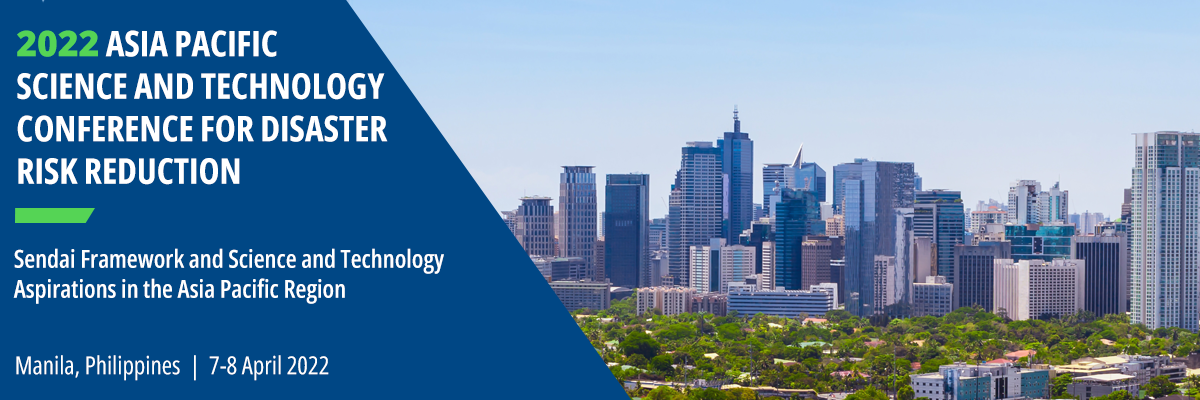
TECHNICAL SESSION #1
Science and Synergies:
Focusing on DRR, CCA and the SDGs
The session will review the newest progress of science-technology-based disaster risk reduction and examine the role of S&T in policy coherence in Asia-Pacific region as contribution to the Sendai Framework Mid-term Review, and introduce the new research agenda of disaster risk in the new context of open science and address the role of science in DRR from a development perspective.
TECHNICAL SESSION #2
Sendai Framework in Advancing Science and Technology in Addressing Disaster Risk Reduction
The session will discuss the role of intra- and trans- disciplinary science and technology in grounding the creation and application of risk-sensitive development measures. It will speak to the successes and insights gained from applying science and technology in relation to the Sendai Framework in Asia and the Pacific. It will also foreground opportunities to accelerate science and technology capabilities for risk-sensitive development, including through transdisciplinary collaboration and enhanced capacity.
TECHNICAL SESSION #3
Localization, Inclusivity, and Science Perspectives: Focusing on Science Advice and Application at the Local Level
The session will feature discussions on (i) understanding risk from local to national: experiences in risk assessments; (ii) the science-policy-practice nexus: experiences in localizing scientific inputs for inclusive DRR; (iii) the use of emerging space and disaster risk mapping technologies at the local level; and (iv) recovery processes at the local level: the role of social sciences.
TECHNICAL SESSION #4
Cities, Climate Change, and Critical Infrastructure
With increasing urbanization, climate change and other anthropogenic pressures, many urban areas are becoming hotspots of disasters. The disruption of essential infrastructure and services such as communication, transport, water, energy, healthcare, flow of finance and support can cripple society in cities. As asset concentration including critical infrastructure and resource utilization are higher in cities, there needs to be stronger evidence of science-based decision making. This technical session will address all key questions specified in the Policy Forum as it pertains to cities, climate change and critical infrastructure. These include potential entry-points for benefiting from the IPCC science policy platform to advance knowledge on multi-hazard DRR, appropriate policy frameworks including the practice of zero-casualty, approaches for estimating loss and damage, indicators of resilience, science communication, stakeholder partnerships and innovations in cities.
Key topics to lead the discussion are as follows:
– State of the Climate in Asia 2020 and implications for DRR (WMO)
– Implications of the AR6 report for cities and DRR (ANCST)
– Science for policy action towards the 2030 Agenda in cities (UNESCO)
– Promoting safer critical infrastructure (CDRI)
TECHNICAL SESSION #5
Science, Innovation, and Entrepreneurship
Science, Engineering, Technology, and Innovation (SETI) is driving the disaster risk management and sustainable development paradigm across the globe. The private sector is emerging as a crucial stakeholder in promoting SETI by funding, supporting, and engaging with government, academia, and communities. Past studies have established that entrepreneurship is decisive in reducing disaster risk and strengthening community resilience. Private sector is not a homogenous entity, and hence the risk and capacities vary on various contributing factor like scale, legality, and sector among others. The private sector’s role is evolving in disaster risk management from being a source funding to be the game changer by using science, appropriate and cutting-edge technology, and innovation to address challenges poised by hazards and by making the business case for disaster risk management and resilience.
This technical session presents the specific characteristics of the private sector enterprises and explore the possible opportunities for building their resilience and sustainability by the adoption of evidence-based, inclusive, informed, all-hazards, and multiple stakeholder approaches towards disaster risk reduction. The speakers will elaborate on risks across various categories of private sector enterprises, emerging trends and SETI based approaches for mitigating these risks.
TECHNICAL SESSION #6
Cascading (including NATECH), Compound, and Systemic Risks
The session will share the experiences in applying the Asia-Pacific Regional Framework for NATECH Risk Management and discuss (i) strengthening regional exchange on disaster risk information and science in order to better understand complex disaster risks, including risks of transboundary, cascading, and compound disasters and (ii) transdisciplinary research to enhance understanding of disaster risk at different temporal and spatial scales ensuring cascading, compound and systemic risk.
U-INSPIRE Innovation Pitch
The proposed program is to organize a U-INSPIRE Innovative Pitch to showcase Youth and Young Professionals contribution on DRR utilizing Science and Technology during the 2022 Asia Pacific Science and Technology Conference for Disaster Risk Reduction (APSTCDRR). The 2022 APSTCDRR aims to provide opportunities to the science, technology, and academia communities in Asia and the Pacific to share experiences on the use of S&T to address compound, cascading and systemic risk, Foster exchanges on the contribution of S&T to inclusive risk governance, Define the contribution of the Asia Pacific region to the implementation of global frameworks and roadmaps related to S&T for DRR, and Review the contribution of S&T in the region to the implementation of the Sendai Framework to be reflected in the Mid-Term Review of the Sendai Framework.
The session would provide a platform for youth and young professionals (YYP) in the region working on DRR to be part of a regional conference, the outputs of which would feed into the 2022 Global Platform for DRR (GPDRR), which will be held in May 2022 in Bali, Indonesia. The expected outcomes include enhanced engagement of scientists from these countries and improved contributions towards major regional discussions in DRR.
Enhanced capacity of these youths and young professionals is also expected to promote science-for-policy, in the context of DRR and the SDGs in Asia and the Pacific. The Session will consist of a mix of invited speakers and an open call with the 14 U-INSPIRE national country members. Successful applications of science and technology in preventing and mitigating risks from different types of hazards including floods, earthquakes, volcanic activity, tsunamis, droughts, health and other climate-related hazards will be showcased.